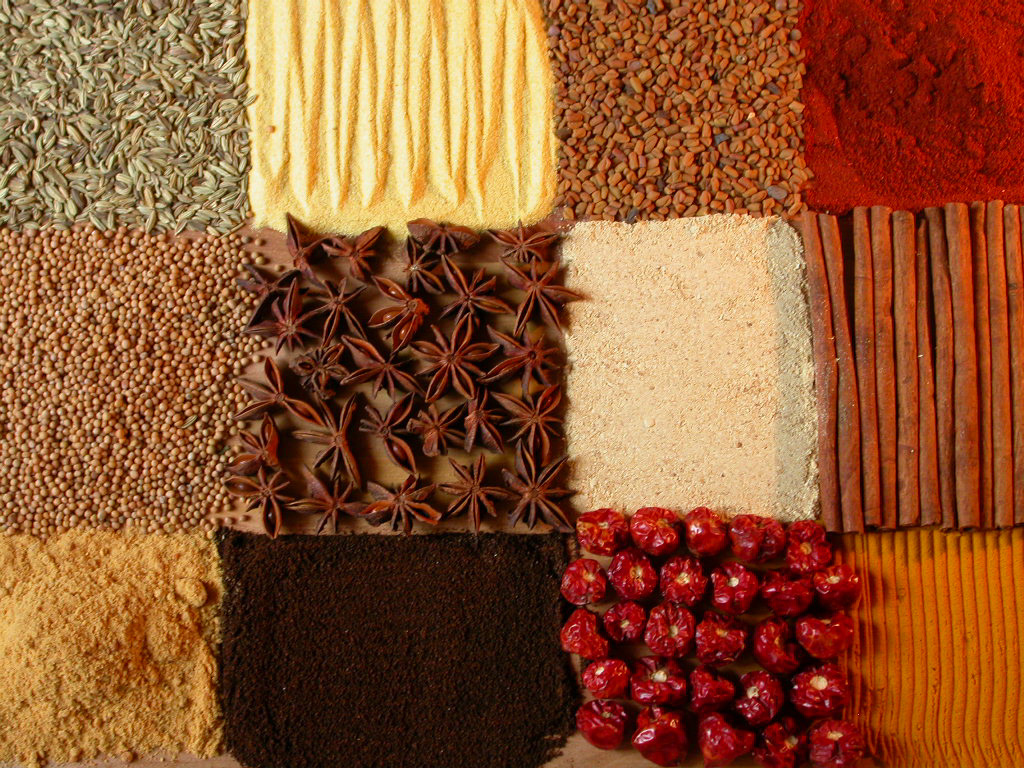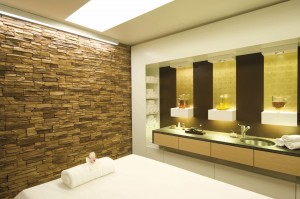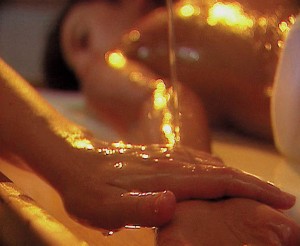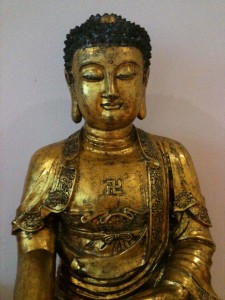“Ayurveda, a Sanskrit word that translates as ‘science of life’, teaches that we all consist of three vital energies known as doshas: kapha, pitta, and vata. Most of us are predominantly governed by one of these doshas and this affects our mental, physical and emotional wellbeing.”
At Europe’s only five-star Ayurvedic hotel, the ancient Indian science is not all about discipline and raw veggies: it’s about balance, fun and sometimes a bit of ice-cream, writes Katie Roche
Arriving at The Parkschlosschen in Frankfurt, Europe’s only five-star Ayurvedic hotel, feels like the start to a James Bond movie. With a Mercedes pick-up from the airport and a winding drive through the Traben-Trarbach valley, you can’t help but feel you’re going somewhere really special and exclusive. As the large gates open, you can see the hotel at the end of the driveway; with classic elegance, it boasts the craftsmanship of art nouveau architect Bruno Mohring. There should be guests waltzing in the dining room, but instead there’s long, empty, white corridors. Everyone is in bed, it’s 9.30pm.
Once in my room, I’m given a jug of hot water and make my first Ayurvedic blunder but I’m here to learn after all. Thinking it is a mistake, I ask for cold water and discover that its supposed to be warm – apparently drinking hot water regularly is a classical Ayurvedic recommendation for improving and strengthening digestive power, and reducing metabolic waste.
All the rooms are furnished with marble bathrooms and the water flows from a nearby mineral spring. My room is furnished in a shade of green that is supposed to have a calming influence, while the cooling effect of the blue rooms is especially recommended for ‘hot headed’ temperaments. Beside the bed, you can play Indian flute music. I never can sleep with music but Rainwater Melody by Maharishi Mahesh Yogi (yoga guru to The Beatles, I discover) has me in a peaceful slumber.
After breakfasting on warm muesli with cooked apples and plums, I meet the owner’s 25-year-old daughter, Carina Preuss, who is now the hotel’s manager. She is beaming with blond shiny hair, blue crystal-clear eyes and perfect skin. At the Parkschlosschen, they do not only practise Ayurveda – they seemingly live it.
“Everything is about balance”, she says, smiling, “I drink a coffee everyday, but I’ll make sure to put cardamom in it to counteract the ill effects.” Her father, who owns the hotel, was once an unwell man until he did an Ayruvedic detox and all his ailments disappeared. It changed his life and he was hooked. This was his motivation for setting up the hotel 18 years ago.
Over a long lunch, Miss Preuss shows her passion for the world of health: ‘How can you not ask why you are sick?’, ‘Mainstream doctors don’t treat the root causes” and ‘If you don’t treat the root causes, you get sick again, right?’ I agree. I really do agree, that’s what brought me here because I believe in alternative medicine, and at 26 years of age, I, too, lost faith in Western medicine after it didn’t work for me. We have a lot in common.
Dessert comes first because of all the six tastes, sweet digests first. Polenta semolina with berries is followed by a courgette soup, and then lastly the main course, which is parsley root and chick peas in tomato with papadums and spiced rice. It’s delicious. Miss Preuss points out that being practical is vital: if we eat bad food most of the time, then we need to introduce some healthy food. If you eat healthy food, and want to eat some ice-cream, then that’s no problem. It’s all about this ‘balance’, and there’s no need to be sitting at home eating celery; it’s important to enjoy food and just apply some commonsense.
Ayurveda, a Sanskrit word that translates as ‘science of life’, teaches that we all consist of three vital energies known as doshas: kapha, pitta, and vata. Most of us are predominantly governed by one of these doshas and this affects our mental, physical and emotional wellbeing. Ayurveda considers it vital to identify your type and then create a lifestyle that sustains and nurtures your unique nature. They say an imbalance of the doshas, if not corrected, leads eventually to disease.
In an age when ’emotional intelligence’ is as important as being clever, it’s no wonder, then, that Ayurveda feels like a very modern science. For instance, a focused pitta person would need to tolerate a vata person’s natural indecisiveness; and a vata person needs to appreciate that their kapha friend is far less manic (and far more laidback!) than they are.
I meet Mr Aruna Bandara, an Ayurvedic physician who will determine my dosha type. He checks my tongue, my pulse, and asks me about my life. “Well, what am I?” I ask. “You’re vata,” he reveals. Maybe this explains why people react with horror when I speedily close the windows in the middle of summer (vatas feel the cold far more than other doshas). Perhaps it also explains why I’m amazed how my work colleagues can last until lunch time without eating a thing (kaphas are unfazed by missing a meal, unlike vatas). Bandara tells me to drink the vata teas, and he recommends a vata oil. But my consultation isn’t over yet.
He starts to point out things about my life; I work too hard, think too much, and need to trust my intuition more. I’m suspicious, just as one is when they are with a fortune teller, but Bandara isn’t trying to tell me my future, he is looking at me now, in the present, in his white doctor coat and with his tanned, dark skin. There is a sense he can see me better than I can see myself. He writes down notes for the masseuses and finally, he announces: “You need to laugh, dance and have fun.”
I feel relieved, it could have been more like early to bed, early to rise and eat more carrots. The best part is that Bandara also prescribes three treatments for relaxation, and as he throws in a forth one for good measure, I feel like all my Christmases have come at once.
Walking down to the treatment rooms is an odyssey in itself, one that you become well-acquainted with; passing the grand piano and the Buddha paintings into the white-tiled reception, taking the shiny steps down into the basement. Everyone knows, as you greet them in your dressing gown and slippers, you’re about to knuckle under the hands of two, hardy people, naked, with lots of oil.
In accordance with Ayurveda tradition, female masseuses only provide therapy for female clients and male masseurs will only provide therapy for male clients. My mind is driven to a halt with the pitchu – a local oil treatment for pains caused by tension, and the Abhyanga – a four-hand massage which is so relaxing I’m actually lifted off the table. Tired, hypnotic and covered in oil, I snooze in my private resting room with the luxury of leaving whenever I feel like it. There’s something very sensual about the four-hand touch, and guests leave those rooms so relaxed they can barely manage a greeting.
Contrary to most Western approaches to nutrition, Ayurveda does not prescribe one diet as best for everyone, such as raw foods, macrobiotics or the basic four food groups, but seeks to individualise nutrition for the individual, based on their dosha type and the particular imbalances in the person that need to be corrected. Food is selected by its elemental balance, its taste, its effects on the body, and qualities of the foods such as hot and cold, moist and dry, light and heavy. For example, since vata is a cold and dry dosha, warm, nourishing foods are good for stabilising vata. On the other hand, cold foods such as cold salads, iced drinks, raw vegetables and greens are not very good for persons with vata imbalance.
At the hotel’s Ayurvedic cookery course, we cook a tasty potato and leek soup with asafoetida. Our competitive sides emerge as we all rush around the kitchen in search of unknown herbs and other ingredients, and it’s a great way to mix with the other guests. Margot the chef marches back and forth dipping her spoon into pots for tasting. A lot of a laughter goes into our meals.
I discover that most of the other guests are on serious detoxes such as the panchakarma, which involves enema and purgation therapy. It lasts between 14-21 days, and many of the guests are here for their second time. One French woman in her 40s tells me the panchakarma aided her recovery from chronic fatigue syndrome. “There’s no doubt that this kind of detox can help anyone with anything,” she says, “It cleans everything out, kinda like giving a car a new engine, and there’s a sense of a new self.”
Some of them have been to India for this therapy in the past, but it’s a long journey and you don’t get five-star luxury there. In India, traditional treatments mostly take place at clinical Ayurvedic hospitals in the cities or at the ashrams in the South. They are proper, indeed, but the beds are like those in a nun’s convent. So, it’s not surprising the guests here like to have their comforts.
The art nouveau town Traben-Trarbach is situated in a quiet valley by the river Moselle. The surroundings are a host to the rare mighty redwood tree and squirrels that, I discovered one early morning, hop from tree to tree, jumping metres at a time. You can take bikes, do a river walk, or stroll through the vineyards.
But that’s if you’ve got the energy – it’s very evident that people are tired here. With no stimulants, far away from deadlines, hectic activity and ringing mobiles, it’s an oasis of wellbeing. I’m exhausted during my three-days here, even getting withdrawal symptoms from having no tea, coffee, and sugar. I would have loved to stay for a week or two; three days feels like it’s only the beginning.
Before I leave, I visit The Buddha Museum close by – home to over 6,000 Buddhas, which is part of an exhibition exploring the world of Buddhism. It was a great finishing touch to a zen-like three days and a nice start back to reality.
After three days of healthy eating, fresh air, massages and tranquil sleep, I leave full of zest for action, and I get to practise Bandara’s recommendations because my next stop is Berlin for a little bit of dancing, fun and a lot of laughter.
HOW TO GET THERE
The writer flew to Frankfurt-hahn airport with Ryanair. The Parkschlosschen (00 49 6541 7050) is a 20-minute drive from there. A three-night Taking-a-Break package is available from €470 per person. The price includes breakfast and evening meals and a daily Ayurvedic massage.





